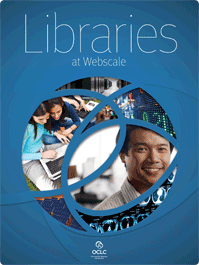Libraries at Webscale
This discussion document, Libraries at Webscale, explores the impact of the Web on our rapidly changing information landscape, and presents an overview of the opportunities and challenges that operating in a Web-connected world provides for libraries and library users. The document presents a case for the opportunities that Webscale can afford libraries and the OCLC cooperative, and provides context for OCLC’s strategies to support libraries at Webscale.
The document examines some of the ways in which the Web has impacted information seeking and how new cloud-based, Webscale services are now at the center of many users’ educational and learning lives. This document contains views of library leaders and insights from trend watchers who write about the future of the Web.
Included are short essays that express the views of:
- Leslie Crutchfield, author, speaker and leading authority on scaling social innovation and high-impact philanthropy
- Thomas L. Friedman, reporter and columnist, and author of The World Is Flat and That Used to Be Us
- Seth Godin, Internet marketing pioneer and author of We Are All Weird
- Professor Ellen Hazelkorn, Vice President of Research and Enterprise, and Dean of the Graduate Research School, Dublin Institute of Technology (DIT), Ireland
- Steven Berlin Johnson, author of Where Good Ideas Come From: The Natural History of Innovation
- Kevin Kelly, co-founder and Senior Maverick of Wired magazine
- James G. Neal, Vice President for Information Services and University Librarian at Columbia University
- Findings from The European Commission on Information Society and Media (ERCIM) on the how cloud computing is impacting the Web
- The OCLC Global Council on the challenges and opportunities facing libraries today and in 2016
We interviewed dozens of library leaders about the future of libraries and key challenges and opportunities they face today and will face in 2016. Their ideas and quotes are presented and distilled in the report and provide specific thoughts as to the need for “radical cooperation” in library services. Librarians from a wide variety of library types, across a worldwide geography were consulted. Surprisingly, their top concerns and aspirations were often in agreement, regardless of library size, location and type.
The videos below highlight the latest thinking from seven experts in technology, education, libraries and marketing who wrote essays for the report. The trends these experts identify point to new opportunities for reshaping and reimagining how information can be delivered and how libraries can increase their reach, impact and visibility.
 Kevin Kelly
Kevin Kelly
Co-founder and Senior Maverick of Wired magazine
 Thomas Friedman
Thomas Friedman
Reporter and columnist, and author of The World Is Flat and That Used to Be Us
 Seth Godin
Seth Godin
Internet marketing pioneer and author of We Are All Weird
 James G. Neal
James G. Neal
Vice President for Information Services and University Librarian at Columbia University
 Ellen Hazelkorn
Ellen Hazelkorn
Vice President of Research and Enterprise, and Dean of the Graduate Research School, Dublin Institute of Technology (DIT), Ireland
 Steven Berlin Johnson
Steven Berlin Johnson
Author of Where Good Ideas Come From: The Natural History of Innovation
 Leslie Crutchfield
Leslie Crutchfield
Author, speaker and leading authority on scaling social innovation and high-impact philanthropy
Suggested citation:
OCLC. 2011. Libraries at Webscale. Dublin, OH: OCLC. https://www.oclc.org/research/publications/all/webscale







